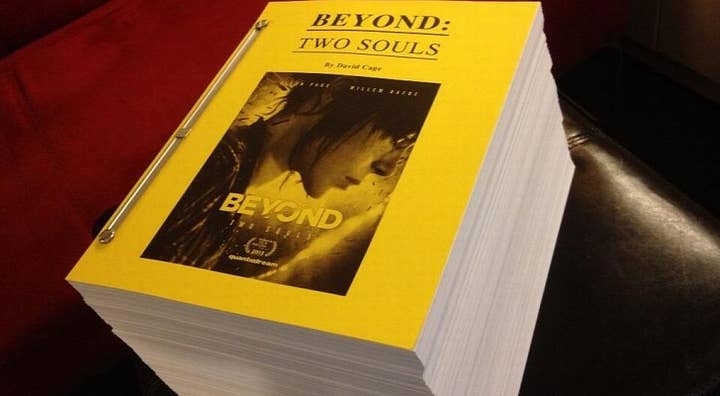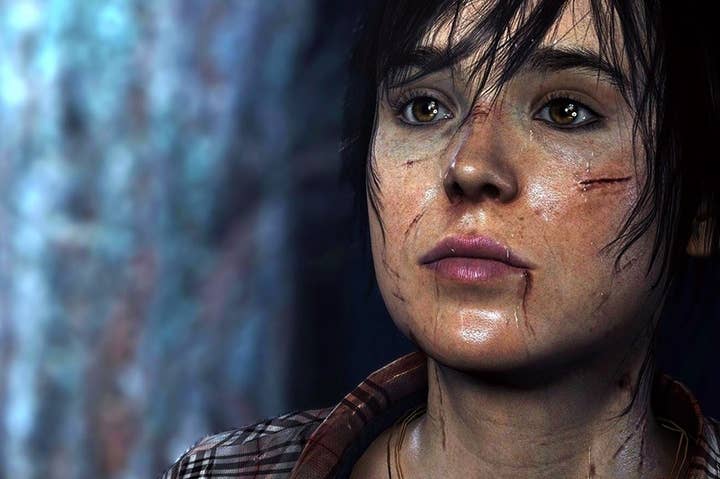De Fondaumiere: UK tax-breaks could be applied retroactively
The Quantic Dream co-founder on taxes, Hollywood and violence
When the UK's industry celebrated securing tax-breaks last year, it did so with a certain degree of caution. Not only had we thought we'd secured the measure before in the UK, only to see it rescinded by a new government, we'd also seen France have to fight tooth and claw with the EU Directorate General of Competition when similar laws were enacted by French parliament in 2007. Now, despite France persuading the EU that the breaks were fair and justifiable, and presumably setting a European precedent, the UK is facing a similar battle against decision makers in Brussels.
That the process of negotiation in France was eventually successful is due in large part to the efforts of Quantic Dream's Guillaume de Fondaumiere, who had fought the case under the auspices of the European Games Developer Federation. Speaking to him recently in Krakow, at the Digital Dragons festival, GamesIndustry International asked him for his advice for the UK's lobbyists, as well as his thoughts on violence, Hollywood and how he feels his new game is changing the cultural perception of gaming as a whole.
First of all, I'm not surprised - this is pretty much exactly what happened in France back in 2007. The first time we went forward with the French government to the EU Directorate General of Competition, we basically thought that everything was sorted, then a similar investigation was started by Brussels. What surprises me a little bit, though, is that we went through that process, so I'm curious to what motivates the DG and the EU commissioner in wanting to question what they've already answered and defined back in 2008. Also, they confirmed it at the end of 2011 by extending the French tax break system until the end of 2017.
"I'm curious to what motivates the DG and the EU commissioner in wanting to question what they've already answered and defined back in 2008"
So I'm a little surprised by that and we're looking to see what we're going to do at EGDF level in this case. We've already told TIGA and Richard Wilson that we are going to be supporting the UK - I think that together we can obtain what we need from the EU, just like we did in 2007, so that the measure can be put in place as soon as possible. One reason for hope, even though I can imagine that British developers are a bit worried, is that in France what we obtained was sort of 'backwards compatibility'.
We got the greenlight from Brussels at the end of 2008, but the measure was implemented retroactively from the beginning of 2008, so we didn't lose a year. That might be something that the British government might also try to enforce so that UK developers don't have to wait another year.
But let me say that I am very optimistic, I think it will go through. I think that the very same arguments that we put forward are going to be heard at a European level. Also the measures are already in place, and very positively so, in France, so I can't see a reason that it would be rejected.

Absolutely not. In fact, at that time, and my friend Yves might not be happy to hear me say this, but Ubisoft was not all that convinced that this measure would be impactful. Not that they weren't supportive, but he thought that the breaks were too little, that 20 per cent wouldn't be enough, in particular for them. It wouldn't reverse their judgement on Montreal, for example, where they were getting the benefit of 50 per cent tax credits. Ubisoft didn't push very much, either the government or the EU, it was really the developers who pushed it through, it was only afterwards that Ubisoft became supportive, but they are now and that's good.
I think that it would be fruitful, but I can't talk for all of the different governments, of course. The opportunity is there. For example, Sweden would like to implement a similar system and they can, because it's in force in France and soon in the UK. So it's up to those countries to say whether they want to support their industry, whether they think it's necessary or not.
What I think is that, back in 2006-7, when I was strongly advocating for similar tax breaks in France as those in Montreal, I was saying - especially to my friends in the UK - be careful. What happened in France was going to happen elsewhere. Unfortunately I was right and I would like to tell other countries in Europe the same thing - be careful. I think the UK reacted two or three years too late, as we did in France. We've never fully recovered from the brain drain that we suffered - I think it's high-time for everyone to understand what's at stake here and take all necessary measures.
"I think the UK reacted two or three years too late, as we did in France"
Whether we like it or not, tax breaks are what works. They've proven extremely effective in keeping a sector vibrant, but also in expanding it. Canada went from being a non-videogame producing nation to what is probably the strongest, with 15-20,000 people working in it. The tax credits system also proved very beneficial to countries who put it in place, because that's generating a lot of incomes. It's a genuinely win-win situation.
Not really - that wasn't the thought process. The inspiration for having Ellen starring in Beyond was the script. David wanted to tell this story of a woman at different ages, who would be both fragile and strong. That was really the initial creative vision. Then we asked ourselves who would be the best actress to embody this character. When you think of how specific this woman is - the fact that she had to be small and fragile, but also becomes strong and capable in combat... We started with a list, as you do when you're casting. She was the first name on it, and it wasn't a long list - maybe three or four names on it.
Fortunately she said yes pretty rapidly after contacting her, so we didn't have to think too much about it. What struck us was when we first met Ellen, David was still writing the script but there was already a fairly solid base, which I had read. We met her in LA in a diner, and we immediately thought: it's her. She had said yes, but we still needed a final confirmation. If she'd said no it would have been incredibly difficult to find someone else. She was our Jodie.

So everything else you said about demographics is true, but that was the consequence of us choosing her because of the part, not the other way around. It wasn't a marketing decision, from the beginning, although we see the benefit of that too. It was driven by the need to have talent.
The same applies to Willem Dafoe - he was top of the list. We wanted to work with an actor of that age, with that experience, but with an open-mindedness for trying new things, which isn't easy. One thing that I think is important is that, I think, if we hadn't made Heavy Rain before, I don't think that the actors would be working with us. We really had to prove our case, I think - not just to them, but to Hollywood in general, I think.
I've been lobbying Hollywood for a long time, and I've had a lot of doors slammed in my face in the past. People would say: sorry, we don't do games. Because games are violent, games are addictive, games are everything but a form of cultural expression. Our talents don't want to get engaged with games.
I think Heavy Rain changed that perception - at least that's the perception I got when I was calling the agencies and talking to talent. They had at least heard of it, they knew it was different. We were pioneering things and it would be interesting. That made my life a lot easier. Beyond will bring us to the next step, I think - demonstrate that in an even more striking manner. It will bring even more talent to the games industry - not just actors but hopefully directors - a whole range of creative talents that I think this industry needs to get to the next level.
"I've been lobbying Hollywood for a long time, and I've had a lot of doors slammed in my face in the past. I think Heavy Rain changed that perception"
No serious study links violent behavior to violent games. I also see no reason to differentiate video games ratings from film ratings. But at the same time, I also believe we need to exercise a critical eye on our medium: is violence portrayed responsibly and contextualized meaningfully in video games ? I believe too often it is not and this is hurting our industry more than we think. While no games endorse openly violence per se, a good chunk - amongst which chart toppers - feature extremely violent protagonists whose mission is to kill and destroy with the primary motive of gaining points or rank.
In some of these very popular games, there is a lack of narrative context combined with very graphical depictions of casualties and deaths. In other words, a form of violence that many outside our industry would categorize as gratuitous violence. I think it is this kind of violence that we, as a medium, need to reconsider.
In Beyond: Two Souls, while there is indeed some degree of violence in certain scenes, violence is not central to the experience. There is a very precise sentiment behind any act of violence in the game, and it is always contextualized. We are also very carefully analyzing how violence is graphically portrayed.
The use of the latest technological advancements or hyper realistic rendering techniques are not necessarily required to express emotion. There are many different ways to express emotion in games.
"I would argue that the chances to recoup on a game, in particular a new IP, are higher when the installed base is at its peak"
I'm for instance in awe of the very poetic, non-realistic approach to emotion of ThatGameCompany. They use an abstract representation and it is nonetheless very powerful. Ueda, Sudo 51, Evans or Cage - to name but these handful creators - have each their very own way of conveying sentiment and thereby expressing themselves through video games and they each use their very own unique palette of tools to craft these. That is what makes video games so powerful as a medium!
For those of us however who have forayed into realism, technological advancement is indeed critical in pretty much every area of the game: graphics of course, but also sound, physics etc…
I would argue in the contrary that the chances to recoup on a game, in particular a new IP, are higher when the installed base is at its peak.
The AAA console market is a highly competitive but proven market and it does offer a great number of opportunities that other platforms still can't offer today: specialized financiers (the publishers) who are capable of entirely financing big projects; a specialized ecosystem for marketing and selling these games (the consoles themselves, press, retail, trade shows, etc…) and last but not least highly educated customers (the core gamers) who we know better and better every year.
At the same time, we have certainly arrived at a tipping point of this market. Retail is going through a very critical phase, the market contracts whilst core gamers are changing habits. A new - more casual - type of audience is emerging and a novel gaming platform is launched almost every month. We thereby need to stay alert and be prepared for change. We believe PS4 and the global PlayStation ecosystem has however everything required to stay competitive in this changing landscape. It is this belief that gives us confidence to continue working with Sony also after Beyond.









